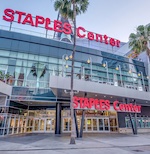 |
There is a very good reason why AEG decided to get paid in cash rather than cryptocurrency for the naming rights of the Staples Center in Los Angeles. Cash will still be in circulation five years from now.
Singapore-based cryptocurrency platform Crypto.com is forking over more than $700M in cold cash to AEG, owner and operator of the arena, for the right to slap its name on the home of the Lakers, Clippers basketball and Kings hockey teams.
In announcing the deal, Crypto.com chief Kris Marszalek said a few years from now people will look back at this day and think this is the moment that cryptocurrencies kind of crossed the cosmos into the mainstream.
Alternatively, people may look back at this day and the amount of cryptocurrency hype and marvel at Crypto.com’s hubris in putting its moniker on the world’s second-most-famous arena.
Crypto.com may suffer the same “stadium curse” that afflicted another once-hyped company, CMGI, which was the darling of the dot.com era.
Andover, MA-headquartered CMGI created or invested in more than 70 companies and generated more than $1.5B in revenues at its peak. Its portfolio included AltaVista, Lycos, Furniture.com. Snapfish and GeoCities.
In 2000, CMGI struck a naming rights deal for the home of the New England Patriots NFL team. It agreed to pay $7.6M a year for 15 years for the right to call the stadium CMGI Field.
In 2002, high-flying CMGI fell to Earth. CNN called it the “poster child for the failed dot.com era.”
Gillette took over naming rights in 2002 with a 15-year deal of its own.
AEG would be wise to keep the Staples signage and promotional materials in storage. They may come in handy some day, not in the very distant future.
Institutional investors say it’s tough to build trust in ESG progress, according to a special report of the Edelman Trust Barometer.
It found that 86 percent of US investors believe companies overstate or exaggerate ESG progress when disclosing results.
Seventy-two percent of investors globally doubt companies will achieve their commitments.
Nearly three in four investors (74 percent) say employee activism is indicative of a healthy workplace culture.
Edelman surveyed 700 institutional investors in the US, Canada, UK, Germany, Netherlands, Middle East and Japan for the study.


 Southern governors claim they know what's best for their working class, and it's not pay raises... A Ukrainian human rights group played a key role in convincing House Speaker Mike Johnson to hold a vote to send arms to Ukraine, Israel and Taiwan... Trump Media & Technology Group blames short-selling and not lousy outlook for its stock slump.
Southern governors claim they know what's best for their working class, and it's not pay raises... A Ukrainian human rights group played a key role in convincing House Speaker Mike Johnson to hold a vote to send arms to Ukraine, Israel and Taiwan... Trump Media & Technology Group blames short-selling and not lousy outlook for its stock slump. The techniques deployed by OJ Simpson's defense team in the 'trial of the century' served as a harbinger for those used by Donald Trump... People worry about the politicization of medical science just as much as they fret about another pandemic, according to Edelman Trust Barometer... Book bans aren't restricted to red states as deep blue Illinois, Connecticut and Maryland challenged at least 100 titles in 2023.
The techniques deployed by OJ Simpson's defense team in the 'trial of the century' served as a harbinger for those used by Donald Trump... People worry about the politicization of medical science just as much as they fret about another pandemic, according to Edelman Trust Barometer... Book bans aren't restricted to red states as deep blue Illinois, Connecticut and Maryland challenged at least 100 titles in 2023. The NBA, which promotes legalized gambling 24/7, seems more than hypocritical for banning player for placing bets... Diocese of Brooklyn promises to issue press release the next time one of its priests is charged with sexual abuse... Truth Social aspires to be one of Donald Trump's iconic American brands, just like Trump University or Trump Steaks or Trump Ice Cubes.
The NBA, which promotes legalized gambling 24/7, seems more than hypocritical for banning player for placing bets... Diocese of Brooklyn promises to issue press release the next time one of its priests is charged with sexual abuse... Truth Social aspires to be one of Donald Trump's iconic American brands, just like Trump University or Trump Steaks or Trump Ice Cubes. Publicis Groupe CEO Arthur Sadoun puts competition on notice... Macy's throws in the towel as it appoints two directors nominated by its unwanted suitor... The Profile in Wimpery Award goes to the Ford Presidential Foundation for stiffing American hero and former Wyoming Congresswoman Liz Cheney.
Publicis Groupe CEO Arthur Sadoun puts competition on notice... Macy's throws in the towel as it appoints two directors nominated by its unwanted suitor... The Profile in Wimpery Award goes to the Ford Presidential Foundation for stiffing American hero and former Wyoming Congresswoman Liz Cheney. JPMorgan Chase chief Jamie Dimon's "letter to shareholders" is a must-read for PR people and others interested in fixing America and living up to its potential... Get ready for the PPE shortage when the next pandemic hits... Nixing Netanyahu. Gaza carnage turns US opinion against Israel's prime minister.
JPMorgan Chase chief Jamie Dimon's "letter to shareholders" is a must-read for PR people and others interested in fixing America and living up to its potential... Get ready for the PPE shortage when the next pandemic hits... Nixing Netanyahu. Gaza carnage turns US opinion against Israel's prime minister.


 Have a comment? Send it to
Have a comment? Send it to 
No comments have been submitted for this story yet.